Introduction
What does a salesman trade with? With your emotions and that’s the way how they become a salesman with your soul.
The contents of the article is: How public tenders are manipulated with and why it doesn’t make sense to tender (apply for) them. How pricing works and how much profit a distributor can make. The next paragraph is about dishonest methods of trading and what type of advice was given to me by a management.
There are categories as: the top-selling, recommended etc. in e commerce websites. Is the top-selling truly selling the most? Are the categories genuine or are they fake?
The difference between a salesmen and a technicians point of view is explained and the utter difference in the way they view the reality. What dangers company owners must face with a strong salesman having no scruples. How this type of person can take over your company and become a behind-the-scene player.
The article is based on my own working experience in an IT B2B sphere. B2B stands for selling from companies to companies. I was selling network infrastructure products at a distributor. I was also responsible for a part of their product portfolio as a purchasing officer. The article is not an investigative report, but a blog post. Experience of others may differ.
There will be a follow-up article. The contents of it will be the bright side of B2B trading and handing over know-how related to trading for newcomers.
Dark side
Public tenders manipulation
Public tenders in the Czech Republic are available at Tender Market. You should browse them as a salesman. The point is to find the ones which match specifications of products which a salesman sells at a company they are employed at.
In a majority of cases when you copy paste requirements from public tenders to the Google, it will direct you straight to a website of a manufacturer. You, as a distributor, finds out, that your products don’t match the requirements. Thus it eliminates you from the tenders.
The next problem you can come across is that you are given little time to create an offer and send it to an awarding authority. You can hardly make it on time. God forbid, if you have to ask the awarding authority for additional information.
How it’s supposed to work
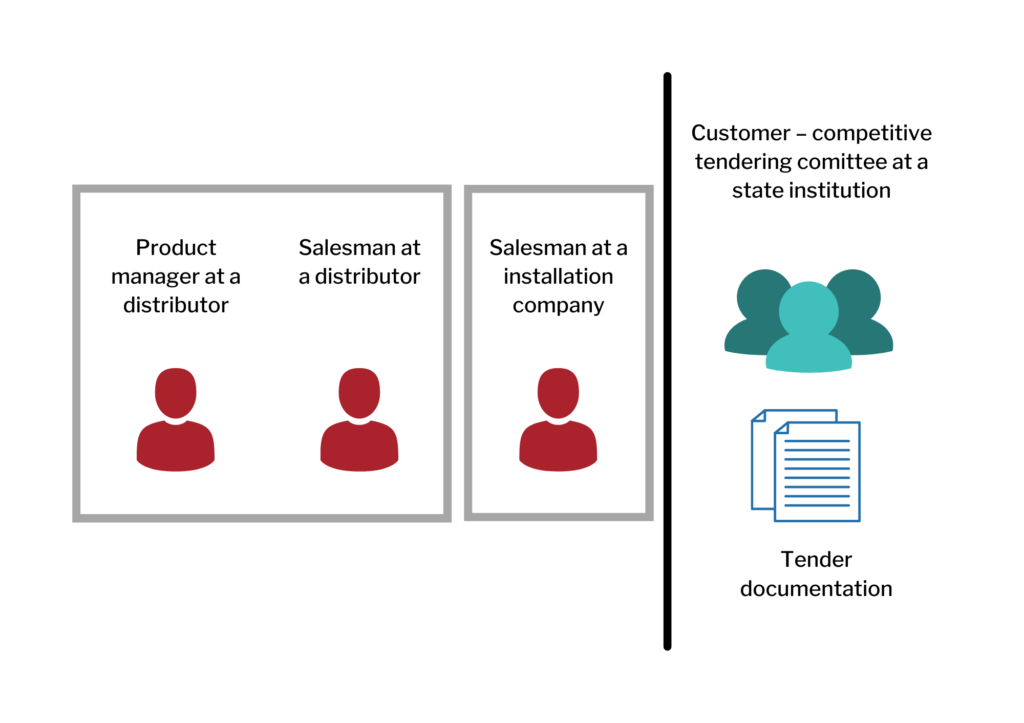
A standard relationship which is not manipulated with should work this way: A state institution, customer, creates a tender documentation. The tender documentation is a document with product / service requirements. Neither a distributor nor an installation company tells the state institution what to write down to the tender documentation. The state institution can ask for specifications of products/services. The state institution should work on the documentation independently.
There is an imaginary wall between the state institution and suppliers. It prevents an information flow from the suppliers in a way that the suppliers dictate what should be in the tender documentation.
How it works
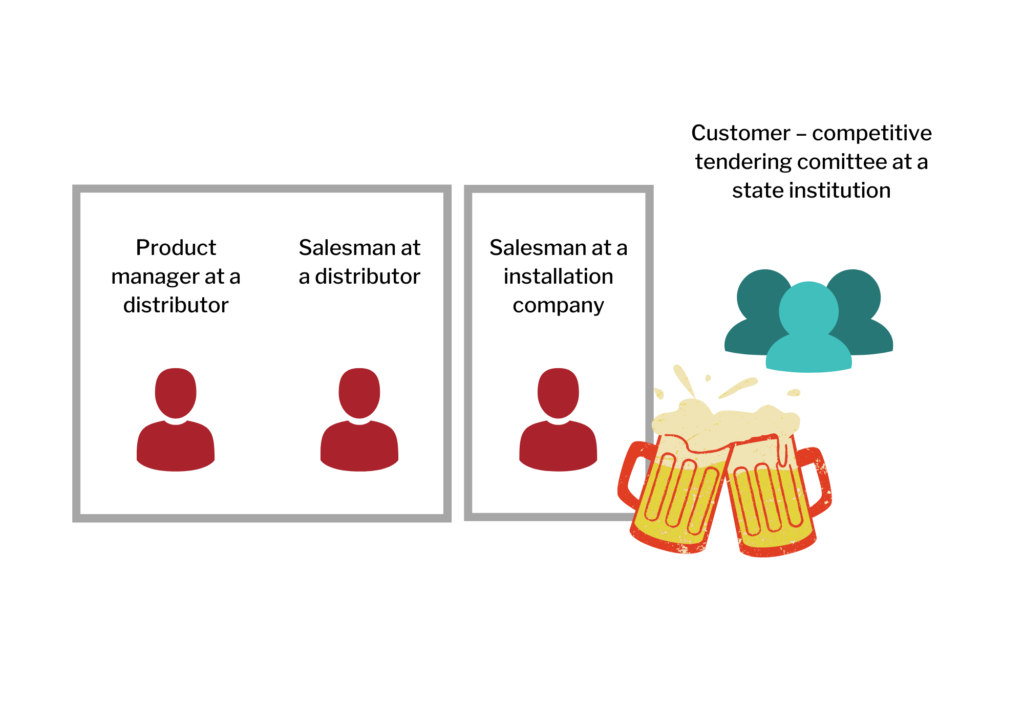
The reality is different. Employees of the installation company and the distributor know officials from the state institution. They usually know each other from early childhood. They go for a glass of beer once in a while. While having the beer, they are chatting about an upcoming competitive tendering. Mr Salesman hands over the information to the official which they (salesmen) would like to have in the competitive tendering. He does it in order to raise the probability of winning the tendering.
After two glasses of beer Mr Official asks: “Isn’t it unethical?”
Mr Salesman replies: “No need to talk now, Bite in the trout which I have ordered to you.”
Flow of information
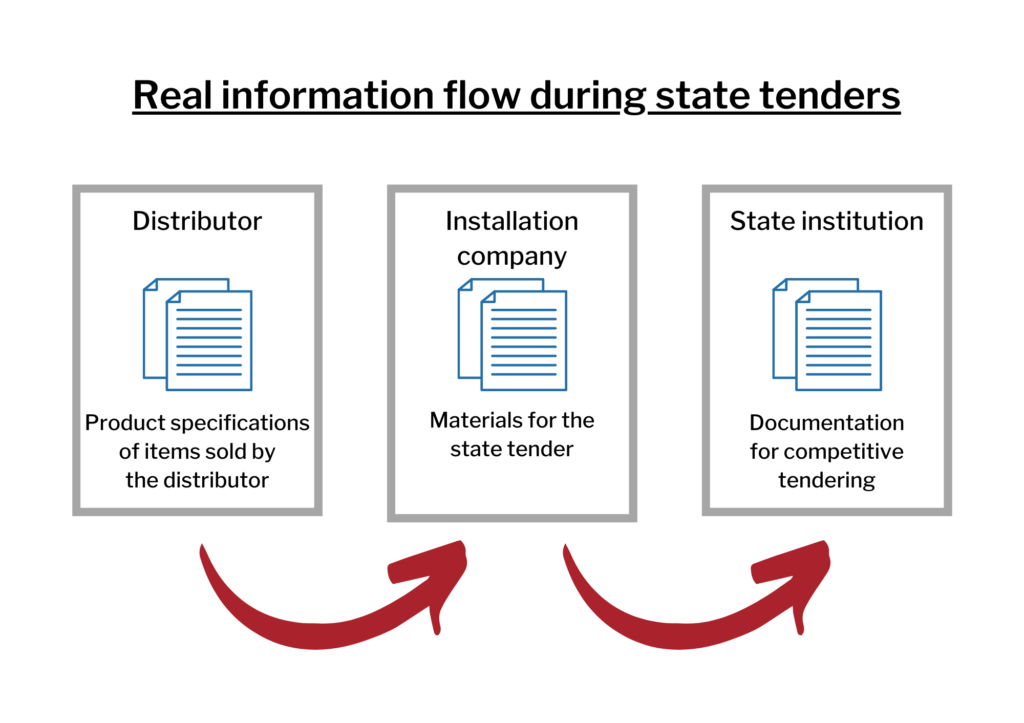
Majority of public tenders are created based on information which is supplied to state institutions by installation companies and distributors. The information (requirements in the tender documentation) are picked in a way that only one manufacturer can meet the requirements thus eliminating competitors. This way it is not so conspicuous.
That is the main reason why requirements in public tenders seem to be copy paste from manufactures’ specifications. And why do you get so little time to create an offer and submit it? Because the real competitive tendering took place at a restaurant while eating the trout.
Pricing
End consumer can be either a company or you. When you buy a TV at an electronics shop, you are the end consumer. This price is called a retail price. Let’s say you buy a TV for 1000 €. This is the retail price. How much does a distributor, who imports it from Taiwan, pays for it? This price is called a purchase price. It may be between -20 % up to -80 % from the retail price.
When you buy the TV for 1000 €, the purchase price can be from 200 € to 800 € for the distributor.
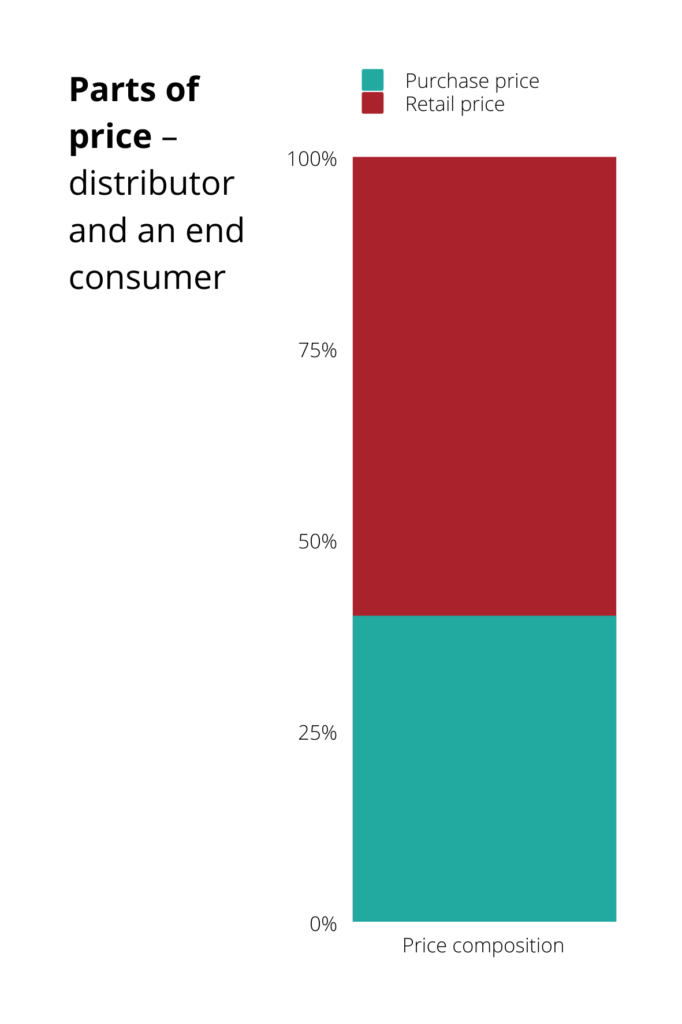
Dishonest trading methods
Advice which I was given by the management was:
“You must manipulate with a customer roughly and have their back to the wall.”
The management
Bad practices which are used by salesmen are for example: Hiding information and talking only about those qualities which are beneficial to customers. The qualities which are tied directly to customers’ needs. A salesman should be a trustworthy source of information. However, it is not true oftentimes. After customers buy the products/services, they find out about the drawbacks and troubles which await them. I call this method a selective information choice.
The next level is lying. Imagine there is written that a device supports a specific functionality in the specifications. The device is tested by technicians. They come to a conclusion that the device doesn’t support the functionality.
The salesman is familiar with the conclusion. The customer asks for the functionality. The functionality is crucial for them. The salesman lies to the customer that the functionality works, even though he was familiarized with the facts that it doesn’t work.
I was at a business meeting. The customer had bought a switch which broke down. He didn’t claim a warranty. It was the first thing he brought me at the meeting. I took the switch and brought it back to the company. I found out the switch still had a warranty for upcoming 2 months. The management asked me how it went at the meeting. I told them about the switch. They replied to me: “Don’t process the warranty claim for him, you will make a shit out of him in the future.”
E-commerce and products sorting
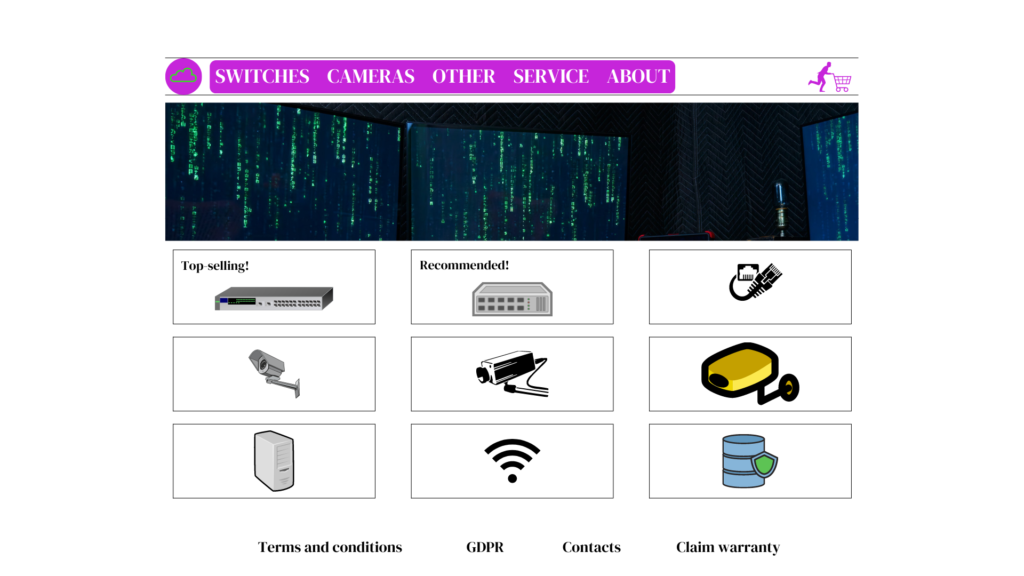
When you browse e-commerce websites, you can sort products out from the top-selling to the least-selling or to have recommended products at the top of a page. You might assume that it is true. It means that the top-selling is really sold the most. Or that the recommended one is really recommended one in the good interest of customers. The top-selling ordering should be carried out automatically without any interference from salesmen.
In reality, salesmen can pick what they consider to be the top-selling or recommended or new products. It can easily happen that the recommended ones are the ones which a company wants to get rid of. This functionality is available in e-commerce website solutions.
Technicians vs salesmen
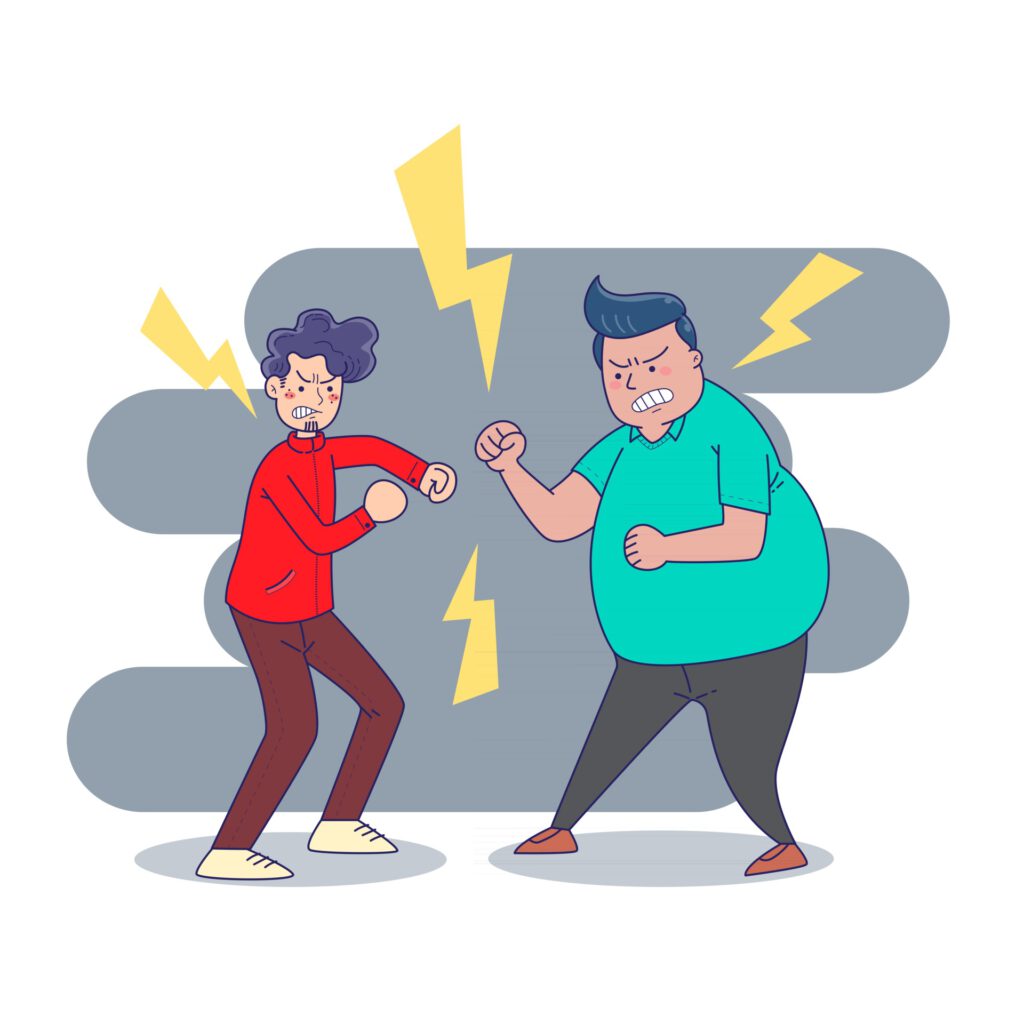
Being able to make a Parisian cake out of a piece of shit. That’s the approach of a salesman to products and services. On the other hand, technicians suffer from mental processes of being able to make a piece of shit out of the Parisian cake.
When the two worlds clash with each other, it can be perceived as Close Encounters of The Third Kind. The salesman tends to belittle the truth and not to disclose important information. They look down on technicians as those “saying nonsense”, who have never left their comfortable chairs. This salesman attitude increases number of service requests for a technical support. It is due to the fact of not telling the truth to customers and the customers demanding what they were promised. The increased service requests raise pressure on technicians and disrupts social peace at a company.
On the other hand technicians tend to belittle product functionalities which work properly. Their perfectionism doesn’t allow them to think other way even in cases they ought to. It creates interesting situations at business meetings. When a technician talks about something, it sounds as hard criticism of the product. It either lowers the chances of selling the product or eliminates it totally.
Ideal solution is to have an agreed signal between a salesman and a technician. When they are both at a business meeting and one of them starts saying nonsense they can stop each other before a disaster takes place. The disaster means extremes such as the shit or the Parisian cake.
There is usually neither a toilet or a dessert plate at a conference room so it’s better off to keep the extremes somewhere else.
Danger of having strong salesman at company
There is a connection between salesmen and customers in the B2B business. When a salesman leaves a company, it usually takes away considerable amount of their customers with them.
The connection is by virtue of of good services given to the customer. The customer has a good relationship with the salesman. They have something in common as hobbies. The customer perceives the salesman in a good light.
Based of the facts aforementioned when the salesman leaves, the customers leave with them. A connection between the company and customers doesn’t exist. It is only between the salesman and customers.
Imagine a situation where you have a salesman at your company. 60 % of our customers are connected on him. This lump of the customers accounts for more than 60 % of your profit. It was a good and a loyal employee at the beginning. He has got over your head gradually. If he left, it could mean so much as a bankruptcy of your own company. This is due to the connection.
It can lead to a very unfavourable situation when this powerful salesman will begin dictate you (to the owner) what you either should or shouldn’t do and takes over the control of your own company. Unfortunately you can do nothing with it. If you fired him, you could loose up to 60 % of your profit.
In addition if you are a person taking care of your own employees and you make a decision not to fire such a person, you’re trapped. It’s like a mouse trap. There is only a way in, not out.

A business department usually has an ERP software. By looking into it, you can find out who’s a responsible salesman for which company. Each customer usually has a salesman assigned.
You can find out about a proportion of profit among salesmen at your company. Use it as a basis for adjusting job duties of each salesman so you don’t reach such unfavourable situation.
You and your experiences
I have written about various drawbacks of the salesman life, how state institutions’ public tenders are manipulated and how a company owner can get in a trap.
What are your experiences? What advice did you get? What’s your experience with public tenders?
Write in the discussion and let’s discuss the matter together.






